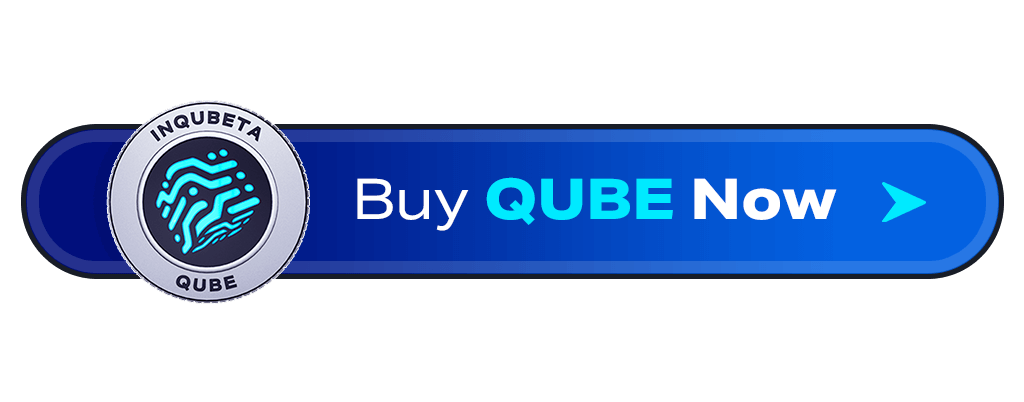
The blockchain space is in fierce competition for developer mindshare, particularly with the rise of Layer 2 solutions and after the recent SEC decision on Bitcoin ETF.
Injective Labs, the team behind the high-speed Injective Protocol, recently entered the fray with the launch of inEVM, its very own Ethereum Virtual Machine (EVM) Layer 2 roll-up. But Injective isn’t the only emerging crypto project making headlines. A new blockchain ICO contender, InQubeta (QUBE), is generating buzz with its innovative approach to supporting AI tech startups – and it’s attracting significant investor interest.
Injective Bets on Interoperability with inEVM
Following a successful testnet phase, Injective has officially launched inEVM on its mainnet. This Layer 2 solution positions itself as a game-changer, boasting the ability to achieve true composability across leading blockchains like Ethereum, Cosmos, and Solana. This aligns perfectly with Injective’s vision of establishing a network of “Electro Chains,” essentially expanding its Layer 2 ecosystem while simultaneously enhancing interoperability across blockchains.
inEVM specifically caters to Ethereum developers by allowing them to build decentralized applications (dApps) that leverage Injective’s blazing-fast speeds and near-zero transaction fees. This seamless integration with the familiar EVM environment and WebAssembly (WASM) opens doors for a wider pool of developers to contribute to the Injective ecosystem.
Looking back, Injective’s rapid growth has been fueled by its status as one of the fastest-growing Layer-1 blockchains. However, the team recognized the growing demand for EVM infrastructure from its developer base. inEVM addresses this need by providing a familiar environment with the added benefits of Injective’s native features and plug-and-play modules.
Injective isn’t alone in embracing the EVM standard. Several other prominent blockchain platforms have recently announced similar initiatives. QuickNode, a leading blockchain infrastructure provider, recently launched its Immutable zkEVM, offering developers a scalable EVM-compatible platform with low transaction costs.
Similarly, Conflux Network has ambitious plans to launch an EVM-compatible Bitcoin Layer 2 solution by May 2024.
InQubeta: The AI Crypto Primed for Takeoff
While Injective focuses on developer experience within the blockchain space, InQubeta (QUBE) takes a different yet equally innovative approach. This upcoming crypto ICO platform aims to revolutionize the way AI tech startups raise capital and surpass Injective in the process.
InQubeta empowers these startups by allowing them to mint their investment opportunities as NFTs. These unique digital assets are then listed on InQubeta’s P2P marketplace, enabling investors to trade them and share in the growth of promising AI ventures.
One of the most attractive features for investors is InQubeta’s unique fractional investment model. This innovative approach allows users to diversify their portfolios by investing small amounts in multiple AI startups.
InQubeta’s ongoing presale is experiencing significant traction, with its native QUBE token selling out rapidly. The top ICO project has already surpassed $11.6 million in funding and distributed over 890 million tokens, highlighting strong investor interest. Currently, QUBE is available at $0.0245, with the price set to increase to $0.028 by the start of Stage 9.
Beyond its popular NFT minting capabilities, InQubeta offers additional benefits to token holders. The platform features a staking mechanism that allows users to earn passive income from their QUBE holdings. InQubeta isn’t just about snagging hot AI startups as NFTs. Holders of the QUBE token can also stack their coins to earn sweet rewards. There’s a dedicated pool fueled by a 2% buy tax and a 5% sell tax, so there’s real potential to boost your returns.
Conclusion
Both Injective and InQubeta are exciting developments with serious potential. Injective’s inEVM is all about making blockchain development smoother and faster by creating an interoperable environment that plays nicely with the EVM. Meanwhile, InQubeta aims to position itself as one of the top DeFi projects, pioneering a new way for AI startups to raise capital with innovative NFT-based fundraising.
Head over to InQubeta’s website to explore their vision for the future of AI and investing. You can also join their buzzing Twitter community to stay on top of the latest developments.


